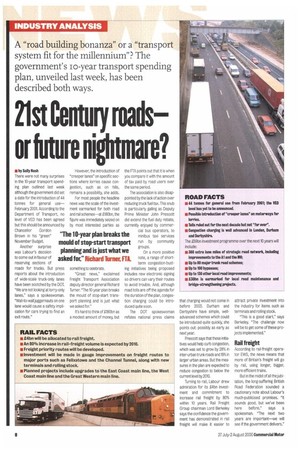21st Century roads or future nightmare?
Page 10

If you've noticed an error in this article please click here to report it so we can fix it.
• by Sally Nash There were not many surprises in the 10-year transport spending plan outlined Last week although the government did set a date for the introduction of 44 tonnes for general use— February 2001. According to the Department of Transport, no level of VED has been agreed but this should be announced by Chancellor Gordon Brown in his "green" November Budget.
Another surprise was Labour's decision to come out in favour of reserving sections of roads for trucks. But press reports about the introduction of wide-scale truck-only lanes have been scotched by the DOT. "We are not looking at lorry-only lanes," says a spokeswoman. "Wall-to-wall juggernauts on one lane would cause a safety implication for cars trying to find an exit route." However, the introduction of "creeper lanes" on specific sections where lorries cause congestion, such as on hills, remains a possibility she adds.
For most people the headline news was the scale of the investment earmarked for both road and rail schemes—at £180bn, the figure was immediately seized on by most interested parties as something to celebrate.
"Great news," exclaimed Freight Transport Association deputy director general Richard Turner. "The 10-year plan breaks the mould of stop-start transport planning and is just what we asked for."
It's hard to think of £180bn as a modest amount of money, but the FTA points out that it is when you compare it with the amount of tax paid by road users over the same period.
The association is also disappointed by the lack of action over reducing truck fuel tax. This snub is particularly galling as Deputy Prtme Minister John Prescott did extend the fuel duty rebate, currently enjoyed by commercial bus operators, to minibus taxi services run by community groups.
On a more positive note, a range of shortterm congestion-busting initiatives being proposed includes new electronic signing so drivers can vary their routes to avoid trouble. And, although road tolls are off the agenda for the duration of the plan, congestion charging could be introduced quite soon.
The DOT spokeswoman refutes national press claims that charging would not come in before 2003. Durham and Derbyshire have simple, welladvanced schemes which could be introduced quite quickly, she points out: possibly as early as next year.
Prescott says that these initiatives would help curb congestion, which was set to grow by 28% in inter-urban trunk roads and 15% in larger urban areas. But the measures in the plan are expected to reduce congestion to below the current level by 2010.
Turning to rail, Labour drew admiration for its £4bn investment and commitment to increase rail freight by 80% within 10 years. Rail Freight Group chairman Lord Berkeley says the confidence the government has demonstrated in rail freight will make it easier to attract private investment into the industry for items such as terminals and rolling stock.
"This is a good start," says Berkeley. "The challenge now will be to get some of these projects implemented.'
Rail freight
According to rail-freight operator EWS, the news means that more of Britain's freight will go by rail, using longer, bigger, more efficient trains.
But in the midst of all the jubilation, the long-suffering British Road Federation sounded a cautionary note about Labour's much-publicised promises. "It sounds good, but we've been here before," says a spokesman. "The next two years are important—we will see if the government delivers."












































































































